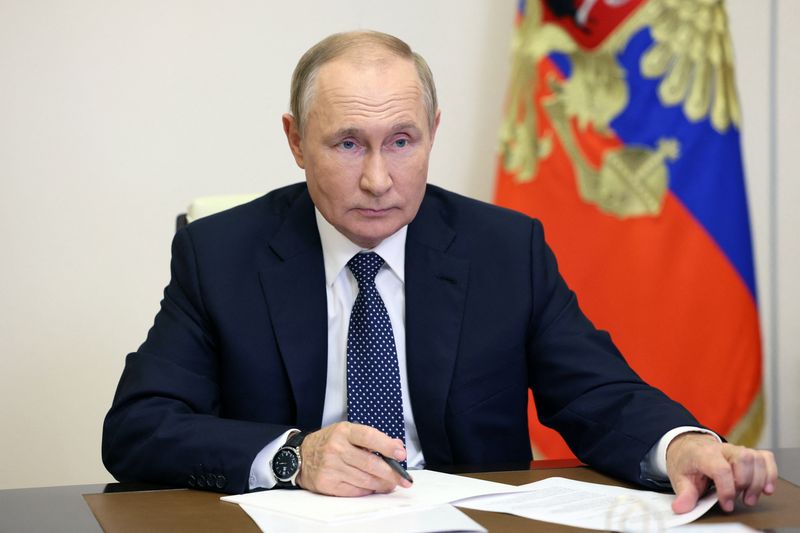LONDON (Reuters) – President Vladimir Putin is grappling with the gravest domestic crisis of his 23-year rule: an increasingly public quarrel inside the Russian elite over who is to blame for the battlefield defeats in Ukraine.
Since he was handed the Kremlin top job by Boris Yeltsin on the last day of 1999, Putin has built around him a fiercely loyal new elite of former spies, businessmen and technocrats who agreed to resolve all disputes in private.
But the humiliating defeats of a former superpower at the hands of much smaller Ukraine have weakened Putin’s authority and stoked a sense of crisis in Moscow not felt since the chaos of the 1990s that he had vowed to extinguish.
“Putin’s authority is being eroded by the military failures in Ukraine – and there is a very real sense that a loss in Ukraine would fatally undermine his authority,” said Sergey Radchenko, a historian of the Cold War at the Johns Hopkins School of Advanced International Studies.
“Russia under Putin has never before been in a state of acute crisis but now there is a sense of acute crisis because every day, as Russia’s position worsens on the battlefield, Putin’s position deteriorates.”
Since 1999, Putin has weathered a series of crises from the 2000 sinking of the Kursk nuclear submarine and the 2002 hostage crisis in a Moscow theatre to the anti-government protests of 2011-12, but no other situation has been as threatening as potential defeat in Ukraine.
More than seven months after Putin ordered the invasion, defeats on the battlefields some 1,000 km (600 miles) away from Moscow have boomeranged back to sap the Kremlin chief’s authority just as he celebrates his 70th birthday.
The Kremlin did not respond to a request for comment but Putin casts the war in Ukraine as a much broader conflict with the West, which he says humiliated Russia after the 1991 Soviet collapse and is now plotting to carve up Russia.
The war, however, has forced Putin to burn through vast amounts of political, economic, diplomatic, and military capital.
Much will depend on how Russia fares this winter.
“Putin is a hostage of the military situation”, said Tatiana Stanovaya, head of the R.Politik political consultancy. “He became much weaker after Feb. 24.”
GOING NUCLEAR?
A severely weakened or even desperate Putin could usher in a much more dangerous phase of the war as he has cautioned the West that any attack on Russian-annexed territory could elicit a nuclear response.
Foreign Ministry spokeswoman Maria Zakharova told reporters on Thursday that Russia’s position – that a nuclear war must never be fought – had not changed.
President Joe Biden said this week Putin’s nuclear warnings had brought the world closer to “Armageddon” than at any time since the Cold-War Cuban Missile Crisis, when the Soviet Union and the United States came closest to nuclear war.
At home, though, Putin faces discord within the elite, which was shocked by both his Feb. 24 invasion of Ukraine and his Sept. 21 mobilisation – the first since World War Two – less than 1-1/2 years before a 2024 presidential election.
Russia’s loss of the bastion of Lyman, which puts western parts of Russian-annexed Luhansk region under threat, angered two close hardline allies, Chechen leader Ramzan Kadyrov and the founder of the mercenary Wagner Group, Yevgeny Prigozhin.
Kadyrov and Prigozhin ridiculed top generals, saying the military was riddled with nepotism and that senior officers should be stripped of their ranks and sent to the front barefoot to atone for their sins.
“The Kadyrov criticism probably reflects an under-the-carpet power struggle in Moscow itself – it is not just him who is airing those views,” said Radchenko.
SHOIGU
Such public anger against top generals and, implicitly, Defence Minister Sergei Shoigu, poses a problem for Putin: does he sack the top brass midway through a war and risk the ire of the military or does he risk taking the blame himself?
Shoigu, one of Putin’s closest allies, was appointed in 2012. The two men regularly spent holidays together in the forests and mountains of Shoigu’s native Tuva region.
Another focus of Kadyrov’s criticism is Valery Gerasimov, chief of Russia’s general staff. Both Shoigu and Gerasimov would need to co-authorise any Russian nuclear strike – as would any potential replacement.
“There are increasing cracks in the elite,” said Abbas Gallyamov, a former Kremlin speechwriter.
“If the army manages to stabilise the front line, then it might take longer, but there will come a point where Putin can neither end the war, nor continue it.”
(Reporting by Reuters)
